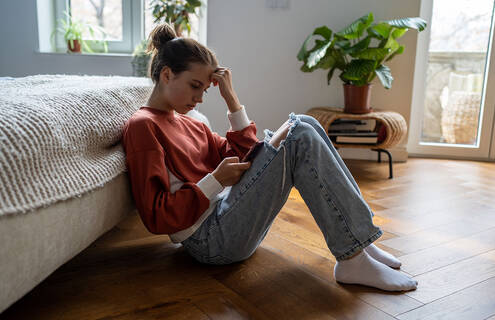
If you're using TikTok, Snapchat or YouTube, chances are it's affecting your mental health. That's even truer for teens.
"We're dealing with a combination of teenage brains and the addictive qualities of social media," says M. Kay Jankowski, PhD, a Dartmouth Health Children's clinical psychologist at Dartmouth Hitchcock Medical Center.
Teens, like many of us, use social media to find connection, be entertained or feel seen.
How can you help a teen manage social media and their mental health? You might think it's as simple as taking away their phone or forbidding social media.
It's not.
Addictive algorithms
Jacob Borodovsky, PhD, is a research scientist at the Center for Technology and Behavioral Health at Dartmouth College's Geisel School of Medicine. He's studying the connection between adolescent technology use, substance abuse and mental health.
The study is exploring the potential role that social media may be playing in mental health problems among teen girls. It's also examining the possibility that video and computer games delay when substance use starts in teen boys.
One variable of the two-year study examines the type of content teens consume.
"Spending two hours reading Wikipedia online probably has a different impact than spending two hours looking at algorithmically driven content on social media," Borodovsky says.
The algorithm he's referring to is targeted ads and content served to social media users to keep us scrolling. (A former project manager at Facebook testified before Congress about the algorithm's harms.)
What makes social media so addictive is how the algorithm rewards users with likes, comments and shares, activating a dopamine rush of motivation and reward.
Algorithms for TikTok and Instagram Reels are even more insidious. We're fed more videos outside our interests, hooking us into searching for more and staying on for longer.
At the 2021 Stanford Institute for Human-Centered AI seminar, Sara Johansen, MD, founder of the university's digital mental health clinic, told the audience, "What keeps us hooked on social media isn't just the pleasure rush of the like. It's the intermittent absence of the like that keeps us engaged."
What are the risks?
Social media addiction is real, says Julie Balaban, MD, a Dartmouth Health Children's child and adolescent psychiatrist at Dartmouth Hitchcock Medical Center.
"Being addicted means the inability to turn it off. Even when you're not on social media, you're still craving and worrying about it," Balaban says. "It's like going through withdrawal."
Social media can make teens feel excluded or develop disordered eating or self-harming behaviors. Teens can also become targets for cyberbullying or sexual predators.
It can also eat up a chunk of their day, leaving little room for other activities or outings with friends. A 2023 Gallup survey found that 51% of U.S. teens spend a minimum of four hours daily on social media.
Is social media to blame for the youth mental health crisis?
Today's mental health crisis started before the pandemic. But in 2020, the line between real life and being online became blurred, Balaban says.
"That's when all of our lives became online—work, school, meetings," Balaban says. "Before that, we were living life. Going online or social media was this extra thing. It's not that way anymore."
The mental health crisis among teens started in 2009, experts say, during the early days of smartphones. The crisis has been fueled in part by social media. But how much social media is to blame remains debatable.
Sarah Lester, MD, a pediatrician at Dartmouth Health Children's New London Hospital, disagrees that the dawn of social media triggered depression and anxiety in teens.
"Social media has certainly exacerbated it," she says. "But which came first? Did social media make teens depressed or were they depressed already and sought comfort scrolling on their phones?"
Subscribe to the Living Better newsletter
Your trusted resource for reliable and up-to-date health and wellness information in the Northeast. Get it delivered to your inbox every other week.
Helping your teen navigate social media and screen time
"If you make it the forbidden fruit, they're going to want it even more," Lester says, adding that banning social media can also make teens feel excluded from friends.
Instead, you can set limits and communicate with your teen and model healthy social media behavior.
Put these tips into practice
No phones in the bedroom at night
Teens ages 13 to 18 need 8 to 10 hours of sleep every night. Encourage teens to get a restful night's sleep by keeping their phone outside of their bedroom overnight. Even better? Do the same with your phone.
A 2021 study found that the frequency of social media use, particularly in the evenings, is related to a delay in bedtime, more difficulties falling asleep, a shorter sleep duration and poorer sleep quality.
Start managing nighttime screen use earlier in a child's life to set the expectation, the study advises, before they are on social media or display symptoms of problematic social media use.
Be aware of feelings
Teens should pay attention to their feelings. Do they feel better or worse before or after scrolling? Encourage them to write about their feelings after being on social media or talk with you.
Funny cat videos might make them happy, while content showing violence, diet advice or their friends having fun without them can cause distress. Encourage a teen to be aware of those feelings after using social media.
"We want kids to feel like they can talk to us about difficult things that happen on social media," Jankowski says. "Because it's a big part of our kids' lives, whether we like it or not."
Set social media and screen time limits
The more time you spend on social media, the higher the risk of anxiety, depression and eating disorders, Lester says.
"If your teen is feeling anxious or depressed, the first thing they should do is back off on social media," she says. "Screen-free time is important on a regular basis."
You can find apps to set parental controls or block social media on your teen's phone. Lester advises following your child on social media and checking their phone.
Model healthy behavior
Adults are using social media as much as teens. And grown-ups need to set a better example, Lester says.
If adults can model appropriate behavior—by keeping their phones out of the bedroom at night, limiting their screen time and not engaging in online arguments—kids will learn from it.
"Social media isn't going away," Lester says. "If you think about it, most of the social media trolls are grownups. So, I think adults need to do better. By doing so, our kids will benefit."
Resources
24/7 mobile crisis response
New Hampshire Rapid Response Access Point
Behavioral Health Crisis Support
NH988 website
833-710-6477 (call or text)
24/7 mobile crisis response
Vermont Crisis Text Line
VT Crisis Text Line website
Text VT to 741741


